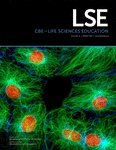A Bridge to Active Learning: A Summer Bridge Program Helps Students Maximize Their Active-Learning Experiences and the Active-Learning Experiences of Others
Abstract
National calls to improve student academic success in college have sparked the development of bridge programs designed to help students transition from high school to college. We designed a 2-week Summer Bridge program that taught introductory biology content in an active-learning way. Through a set of exploratory interviews, we unexpectedly identified that Bridge students had developed sophisticated views of active learning, even though this was not an explicit goal of the program. We conducted an additional set of semistructured interviews that focused on active learning and compared the interviews of Bridge students with those from non-Bridge students who had been eligible for but did not participate in the program. We used the constant comparative method to identify themes from the interviews. We found that Bridge students perceived that, because they knew how to approach active learning and viewed it as important, they benefited more from active learning in introductory biology than non-Bridge students. Specifically, Bridge students seemed to be more aware of their own learning gains from participating in active learning. Compared with the majority of non-Bridge students, the majority of Bridge students described using a greater variety of strategies to maximize their experiences in active learning. Finally, in contrast to non-Bridge students, Bridge students indicated that they take an equitable approach to group work. These findings suggest that we may be able to prime students to maximize their own and other’s experiences in active learning.



